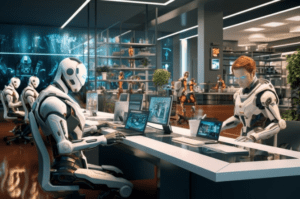The Potential Influence of Artificial Intelligence on Employment
Introduction
Artificial Intelligence, commonly known as AI, is currently orchestrating a paradigm shift in our world at an unparalleled velocity. From voice-responsive virtual aides such as Siri and Alexa to self-driving vehicles and anticipatory text systems, AI seamlessly melds into our everyday existence. Nevertheless, as AI advances, concerns burgeon concerning its capacity to displace human employment. In this dialogue, we will delve into the consequences of AI on the labor market and ascertain whether it indeed constitutes a menace to human vocations.
Understanding Artificial Intelligence
 Before embarking on the examination of labor market consequences, it is vital to apprehend the essence of artificial intelligence and its functional mechanisms. AI encompasses the evolution of computational systems endowed with the ability to execute functions that traditionally necessitate human cognitive faculties. These functions encompass puzzle-solving, knowledge acquisition, linguistic comprehension, and decision-making.
Before embarking on the examination of labor market consequences, it is vital to apprehend the essence of artificial intelligence and its functional mechanisms. AI encompasses the evolution of computational systems endowed with the ability to execute functions that traditionally necessitate human cognitive faculties. These functions encompass puzzle-solving, knowledge acquisition, linguistic comprehension, and decision-making.
AI systems operate with extensive datasets, harnessing them to refine their performance. They can be trained to execute specialized roles such as visual pattern recognition, linguistic interpretation, and even intricate computations. A subset of AI, known as machine learning, bequeaths these systems with the capability to learn and adapt without explicit programming.
The Impact of AI on Employment
AI has inaugurated a profound metamorphosis of the labor market, yet the assessment of its influence is a multi-faceted undertaking. Let us scrutinize both facets of this discourse.
Employment Substitution
 A predominant apprehension encircling the impact of AI on employment pertains to employment substitution. As AI systems progress, they can mechanize mundane, repetitive, and labor-intensive responsibilities. This mechanization can culminate in workforce reductions within sectors where such actions are prevalent. Notably, industries such as manufacturing, customer service, and data entry have already observed automated procedures superseding human toil to some extent.
A predominant apprehension encircling the impact of AI on employment pertains to employment substitution. As AI systems progress, they can mechanize mundane, repetitive, and labor-intensive responsibilities. This mechanization can culminate in workforce reductions within sectors where such actions are prevalent. Notably, industries such as manufacturing, customer service, and data entry have already observed automated procedures superseding human toil to some extent.
Nonetheless, it is indispensable to recognize that not all professions are equally prone to mechanization. Occupations mandating creative ideation, emotional sagacity, and intricate decision-making are less amenable to AI mechanization. Consequently, while certain occupations may confront substitution, innovative career opportunities may arise within domains related to AI conception, maintenance, and supervision.
Employment Enhancement
While AI may engender the displacement of particular roles, it also possesses the potential to amplify a multitude of others. AI can function as a valuable instrument to enhance productivity and effectiveness across diverse sectors. For instance, in the medical sector, AI-fueled diagnostic tools can significantly enhance the precision and punctuality of diagnoses, ultimately ameliorating patient care.
Moreover, AI can bring the emergence of novel employment positions. The demand for AI researchers, data scientists, machine learning engineers, and AI ethics specialists is on the ascent to facilitate the development, surveillance, and governance of AI systems. As AI advances, entirely unprecedented vocations may ascend to the fore, providing prospects for employment proliferation.
Magnification of Human Competence
 AI harbors the potential to magnify human capacities rather than wholly supplant them, particularly in industries where responsibilities are excessively hazardous or time-intensive for human execution. For example, Artificial Intelligence can be tackled in mining, development, and search and salvage missions to brace security and proficiency. Artificial Intelligence can likewise offer help to individuals with incapacities, empowering them to be more useful and free.
AI harbors the potential to magnify human capacities rather than wholly supplant them, particularly in industries where responsibilities are excessively hazardous or time-intensive for human execution. For example, Artificial Intelligence can be tackled in mining, development, and search and salvage missions to brace security and proficiency. Artificial Intelligence can likewise offer help to individuals with incapacities, empowering them to be more useful and free.
Conclusion
The effect of AI on the work market is a complicated and complex peculiarity. While worries about AI supplanting positions are legitimate, it’s similarly essential to perceive upgrading existing roles’ potential. Additionally, AI paves the way for the creation of new and innovative occupational positions. The future of employment will likely center on a symbiotic relationship between humans and AI. Humans will focus on tasks requiring creativity, empathy, and complex decision-making, while AI will handle repetitive and data-intensive functions.
Effectively navigating this evolving occupational terrain relies on education and adaptability. Individuals must cultivate competencies less vulnerable to mechanization and remain abreast of shifting labor market requisites. A commitment to perpetual learning and an enthusiasm to embrace novel technologies will be imperative in an era increasingly dominated by AI.
Furthermore, governmental policies, corporate entities, and educational institutions have a pivotal role to play in preparing the workforce for the AI era. By investing in retraining initiatives, endorsing research and development, and advocating responsible AI advancement, we can ensure that AI technology benefits society without precipitating widespread job substitution.
In summation, while AI is reshaping the employment landscape, it does not inherently pose an existential jeopardy to employment. Embracing the potential of AI can significantly enhance efficiency and dynamism in the labor market. It’s a more constructive stance than harboring apprehensions about its impact.
